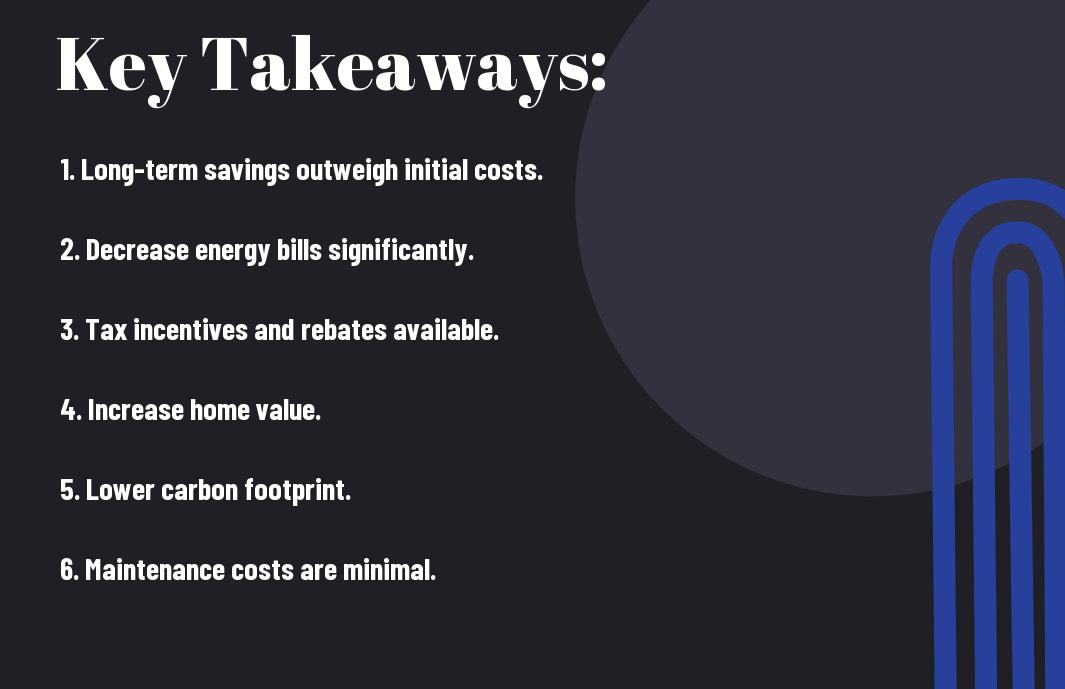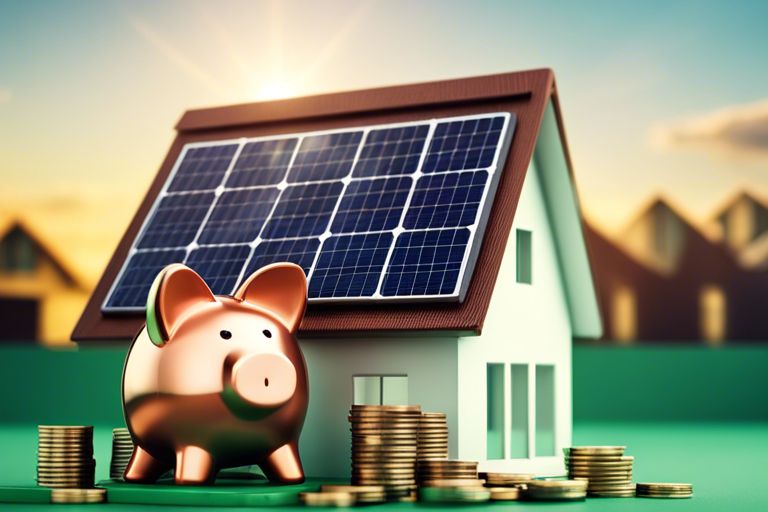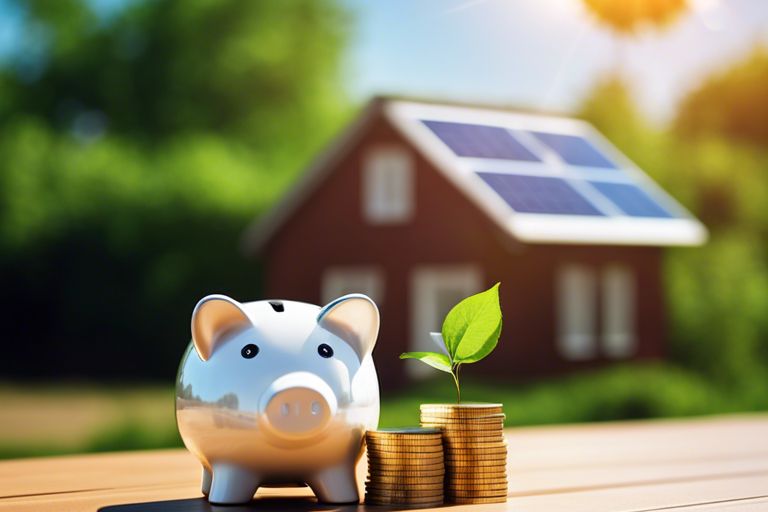It’s time to shed some light on whether investing in solar panels truly saves you money in the long run. With the promise of reduced electricity bills and potential government incentives, you may find yourself contemplating this eco-friendly upgrade for your home. Exploring the financial, environmental, and practical aspects of solar panels will help you make an informed decision that aligns with your goals and values. Let’s explore into the facts and figures to uncover the reality behind the savings that solar panels can bring to your household.
Key Takeaways:
- Savings Over Time: Solar panels can lead to significant cost savings over the long term as they reduce or eliminate the need for traditional electricity.
- Environmental Benefits: Using solar panels can lower your carbon footprint and contribute to a cleaner environment.
- Government Incentives: There are often government incentives and tax credits available for installing solar panels, further reducing costs.
- Energy Independence: Solar panels provide a sustainable and renewable source of energy, giving you more control over your electricity usage.
- Increased Property Value: Homes with solar panels typically have higher property values, potentially leading to a better return on investment when selling.

The Cost of Solar Panels
While Do Solar Panels Really Save Money? is a common question, it’s vital to consider the various costs involved in owning solar panels. The initial investment, maintenance, and repair expenses all factor into the overall cost of utilizing solar energy for your home.
Initial Investment
Investment in solar panels can be significant, including the cost of the panels, installation, permits, and other necessary components. However, incentives like tax credits and rebates offered by the government can help offset some of these initial expenses. Additionally, with advancements in technology and increasing demand for renewable energy sources, the overall cost of solar panels has been decreasing in recent years.
Maintenance and Repair Expenses
Investment in maintaining and repairing your solar panels is vital to ensure they operate efficiently and last for their intended lifespan. While solar panels are generally low maintenance, periodic checks and cleaning may be required to optimize their performance. In the rare event of a malfunction or damage, repair costs can vary but are typically covered under warranty. Regular maintenance and prompt repairs can help maximize your solar panel investment and ensure long-term savings on your energy bills.
Another important aspect to consider is the longevity of solar panels. Typically, solar panels come with warranties ranging from 25 to 30 years, ensuring that you can rely on them for years to come. Regular monitoring and upkeep of your solar panel system can help extend their lifespan and continue to save you money on your energy expenses in the long run.
Electricity Savings
Reduced Energy Bills
If you’re looking to save on your energy bills, solar panels can be a game-changer. By generating your own electricity from the sun, you can significantly reduce your reliance on traditional power sources. This means lower monthly bills and potential savings over the long term.
Peak Sun Hours and Energy Production
Peak sun hours refer to the periods during the day when sunlight is strongest and most abundant. This is crucial for solar panel efficiency, as more sunlight means more energy production. By understanding peak sun hours in your area, you can optimize your solar panel system to capture the maximum amount of sunlight and generate more electricity.
Hours with peak sun exposure vary based on location and season. Being aware of these patterns can help you adjust your energy usage to align with peak production times, maximizing your savings potential.
Net Metering and Grid Connection
Solar panels not only help you save on electricity bills through reduced energy consumption but also through net metering. This system allows you to send excess electricity generated by your solar panels back to the grid, earning you credits that can offset future power consumption.
By staying connected to the grid, you have access to electricity when your solar panels aren’t producing enough, ensuring a reliable power supply. This way, you can enjoy savings on your electricity bills while also contributing to a more sustainable energy grid.
Incentives and Rebates
Now let’s talk about the various incentives and rebates that can help you save money when installing solar panels on your property.
Government Tax Credits
Any homeowner considering solar panels should be aware of the federal investment tax credit (ITC). This credit allows you to deduct a portion of the cost of your solar energy system from your taxes. Currently, the ITC covers 26% of the installation cost and will decrease to 22% in 2023. Taking advantage of this credit can significantly reduce the overall cost of going solar.
State and Local Incentives
The state and local incentives can vary widely depending on where you live, but they often include additional tax credits, rebates, and performance-based incentives. These incentives are designed to encourage homeowners to invest in renewable energy sources like solar power. Researching what incentives are available in your area can help you maximize your savings when switching to solar energy.
The availability and types of state and local incentives can change frequently, so staying up to date with any new programs or changes to existing ones is crucial. This information can usually be found on government websites or through local solar energy providers. The more you know about the incentives available to you, the better equipped you’ll be to make an informed decision about going solar.
Utility Company Rebates
This section will discuss the rebates some utility companies offer to customers who install solar panels. You may be eligible for cash rebates or credits on your utility bills for generating clean energy with solar panels. These rebates can help offset the initial costs of installation and make solar power even more affordable for you.
One notable benefit of utility company rebates is that they provide immediate savings on your solar panel investment. By partnering with your utility company and taking advantage of these rebates, you can start seeing the financial benefits of solar energy sooner rather than later. This not only helps you save money in the long run but also contributes to a more sustainable energy future for everyone.
Increased Property Value
Unlike other home improvement projects, installing solar panels can significantly increase the value of your property. This boost in property value comes from various factors that make solar panels an attractive feature for potential buyers.
Appraised Value Boost
One way solar panels can increase your property value is through the appraised value of your home. Appraisers typically consider the presence of solar panels as a premium feature, which can result in a higher valuation for your property. This means that not only are you saving money on your energy bills, but you are also potentially increasing the equity in your home.
Resale Value Enhancement
With solar panels, your home becomes more attractive to environmentally-conscious buyers who are looking for energy-efficient features. This increased demand can lead to a higher resale value for your property. In addition, homes with solar panels tend to sell faster than those without, giving you a competitive edge in the real estate market.
Another benefit of increased property value with solar panels is the potential for a higher resale price. As the demand for sustainable homes continues to rise, having solar panels installed can make your property stand out among listings and potentially fetch a higher price when you decide to sell.

Environmental Benefits
Carbon Footprint Reduction
All the electricity you use from the grid comes from burning fossil fuels like coal, oil, and natural gas, which release carbon dioxide into the atmosphere. On the other hand, solar panels generate electricity by converting sunlight into energy without emitting any greenhouse gases. By installing solar panels on your property, you can significantly reduce your carbon footprint and help combat climate change.
Air and Water Pollution Decrease
To further add to the environmental benefits, solar panels not only reduce carbon emissions but also help decrease air and water pollution. Traditional energy sources like coal and natural gas power plants release harmful pollutants such as sulfur dioxide, nitrogen oxides, and mercury into the air and waterways. By switching to solar energy, you can play a part in improving air quality and protecting water sources.
It is important to note that air and water pollution have detrimental effects on human health and the environment. By transitioning to solar panels, you are contributing to creating a cleaner and healthier planet for current and future generations.

Comparison to Traditional Energy Sources
Fossil Fuel Costs and Emissions
On one side of the spectrum, traditional energy sources like fossil fuels have been the backbone of our energy supply for years. However, their costs are not just monetary. When you compare the costs of using fossil fuels for electricity generation to the costs associated with solar panels, you need to consider not only the financial implications but also the environmental impact. Fossil fuels are known for their high carbon emissions, which contribute significantly to global warming and air pollution.
| Factors | Comparison |
| Costs | Solar panels require an upfront investment but have lower operational costs over time compared to fossil fuels. |
| Emissions | Solar panels produce clean energy with no greenhouse gas emissions, unlike fossil fuels that contribute to climate change. |
Nuclear Energy Comparison
One aspect of comparing solar panels to traditional energy sources like nuclear power is the level of risk involved. While nuclear energy is considered a low-emission energy source, the potential hazards associated with nuclear accidents, such as Chernobyl and Fukushima, are significant. Solar panels, on the other hand, have a much lower risk profile and do not pose the same safety concerns.
| Risk | Comparison |
| Environmental Impact | Solar panels have minimal environmental impact and do not produce radioactive waste like nuclear power plants. |
| Safety | Solar panels are safe to install and use, while nuclear power plants pose inherent safety risks and the potential for catastrophic accidents. |
When considering the comparisons between solar panels and nuclear energy, it’s imperative to weigh the benefits and drawbacks of each energy source carefully to make an informed decision about which option aligns best with your priorities.
Renewable Energy Alternatives
To understand the true savings potential of solar panels, you should also explore other renewable energy alternatives. Sources like wind power and hydropower offer similar benefits to solar energy, such as reduced carbon emissions and long-term cost savings. By diversifying your energy sources through a mix of renewable options, you can further enhance your energy resilience and sustainability.
| Alternatives | Benefits |
| Wind Power | Like solar panels, wind power generates clean energy and can help reduce your carbon footprint. |
| Hydropower | Hydropower is a reliable renewable energy source that can supplement solar energy production, especially in regions with abundant water resources. |
Energy sustainability is a multifaceted challenge that requires a comprehensive approach. By exploring a mix of renewable energy alternatives, including solar panels, you can contribute to a more sustainable energy future while potentially saving money on your energy bills.
Summing up
Now, after exploring the details and analyzing the facts presented in the article “Do you really save money with solar panels,” it becomes clear that solar panels can indeed help you save money in the long run. By harnessing the power of the sun to generate electricity for your home, you can reduce your energy bills and even earn credits for excess energy produced. To dive deeper into how solar panels can save you money, check out How Do Solar Panels Help Save You Money?.
Q: How much money can you save with solar panels?
A: The amount of money you can save with solar panels depends on various factors such as the size of your system, your energy usage, local utility rates, and any available incentives or rebates. On average, homeowners can save thousands of dollars over the lifetime of their solar panels.
Q: Are there any upfront costs associated with installing solar panels?
A: Yes, there are upfront costs associated with installing solar panels, including the purchase of the panels, inverters, mounting equipment, and installation fees. However, these costs can often be offset by tax credits, rebates, and financing options, making solar panels a cost-effective long-term investment.
Q: How long does it take to recoup the initial investment in solar panels?
A: The payback period for solar panels can vary depending on your location, energy usage, and the cost of electricity in your area. On average, most homeowners recoup their initial investment in solar panels within 5 to 10 years. However, with energy savings and incentives, some homeowners may see a quicker return on investment.
